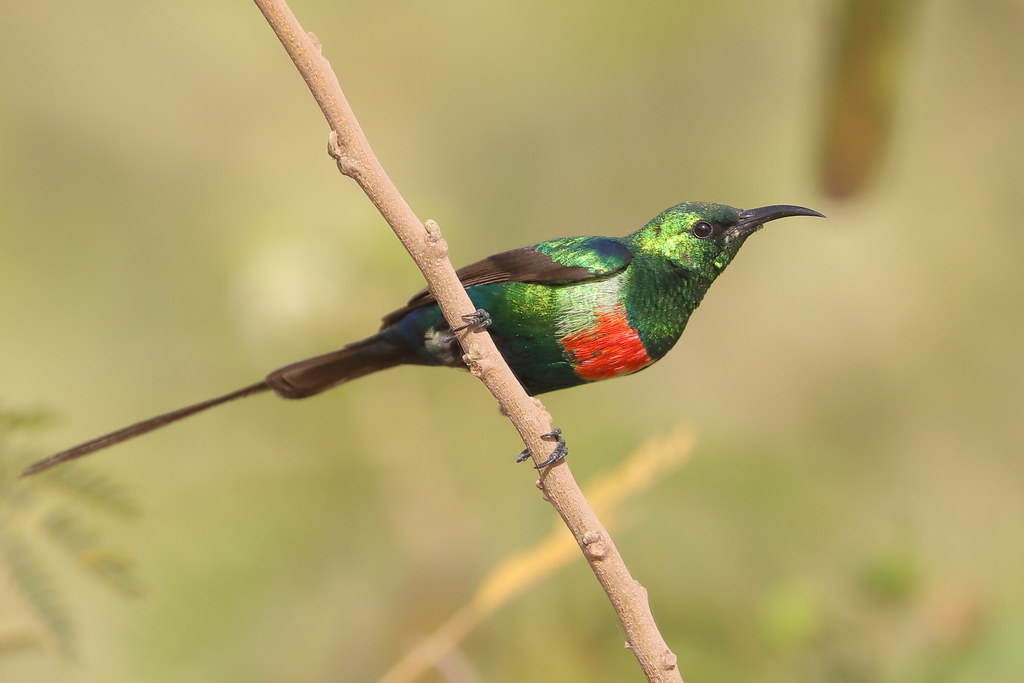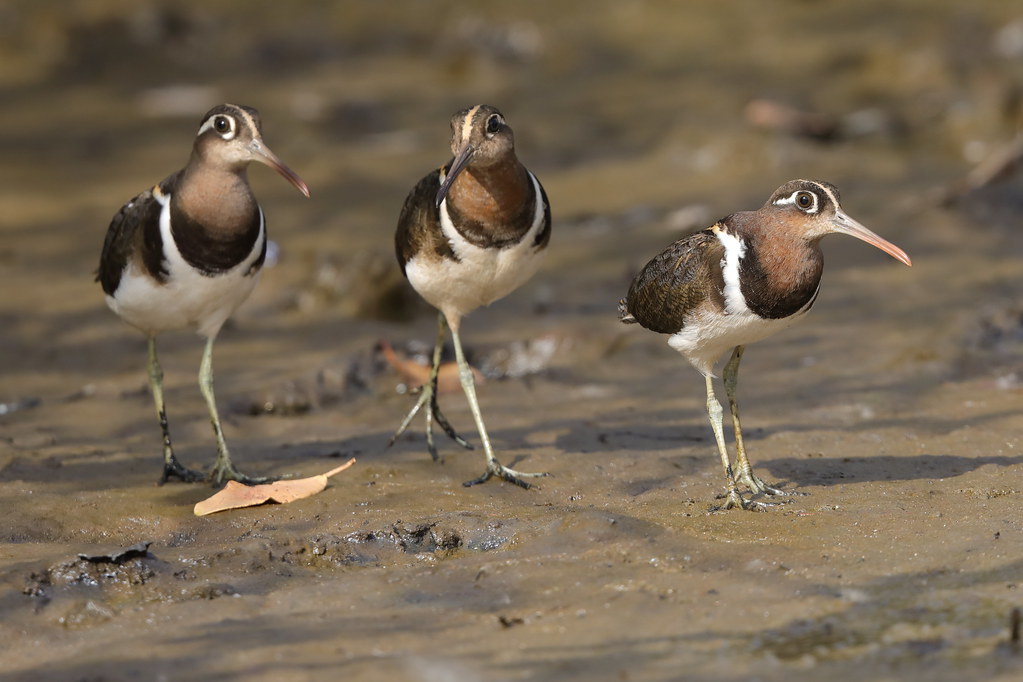So, with a lot of time to search the local area what did I end up with?
I'm not going to post too many shots of the likes of species I have seen before, after all I recorded something in the region of 100 species on camera. Instead I'll share the special ones.
Early in the first week I was out early and met a bird guide and his client who were happy to share their sighting, a Striped Kingfisher,

I later found out that there were supposedly 2 in the area so I looked several times and found one of them anyway.This was a Kotu first for me and I was able to get my best shots of the species ever.

Another Kotu first, and a special bird was a Little Bittern.

It was pretty furtive, refusing to come out to the edge of the mangroves.

It was only the third time I have ever seen one so very pleasing to see it at all, especially as it disappeared altogether the last week I was there.
While I was sat waiting for the Little Bittern to appear a Grey Woodpecker paid a visit to a dead tree stump.

giving some excellent views but it was one seen quite often in several spots.

The Fine -spotted Woodpecker pair were even more obliging on one morning walk.

I had them both on the same stalk

Another bird that gave me possibly my best ever shots was a Giant Kingfisher that I found sat on an old bridge support.

but one I didn't bother with at all really was the Pied Kingfisher

I, like most who visit had overdosed on the species in the past so ignored them until the last day when I added to the 4 shots I already had, one of a bird with fish. You can't really go home without one can you? It's such an easy shot to get in TG though, unlike the Kingfishers we have in the U.K. where you are lucky to get a shot at all.

Note the African Spoonbill legs in the background!!
Getting decent shots of Sunbirds isn't easy, well maybe the Beautiful Sunbird isn't too bad.

but I was really annoyed with myself for messing up an opportunity with this Splendid Sunbird. Probably the best I have ever managed but could have been soo much better. Sat still, OK, I'm hand holding a 500mm and the bird is in deep, deep shade but did I really need a shutter speed of 1/2000th? No! It pushed the ISO up to 10,000.

I was too busy checking the exposure to notice what settings I had. Never mind.
One of my best finds though were some Grey-backed Camaroptera that were holding territory in a distant corner that I have never ventured to before. They are easy to hear but hard to photograph as they move around in the scrubby bushes. It took me two mornings work to get these

but I was a happy tog as a result.

There is one bird that I never tire of seeing and photographing and on this trip I think I did better than ever.

They are stunning little birds but are very shy too.

The local bird guides put a lot of time and effort in to building a special hide to view them and so it's with a sense of bemusement, disappointment, bewilderment...you name it... but they have allowed it to fall in to total disrepair.
They even laid a 50m or so footpath made of old car tyres filled with what is now compacted mud that's as hard as concrete that allows a passage through the black slimy mud .
So much hard work and yet it has all been wasted, well not quite. The footpath was a great aid still and although the hide doesn't offer much camouflage it's still a great spot to see the Snipe. I went three times in all, two were pretty much no shows, in fact the first visit drew a total blank but I glad I tried again because the second visit was the most spectacular I have had.

So in finishing this report all I can say is if you have never been I don't think you'll be disappointed. There are now hotels to cover most tastes and budgets but think carefully when you choose. The tourist season runs from November through to April and when ever you go there will be plenty about. Will I return? I guess it's inevitable! When I'm looking for some winter sun and a cheap break it's the first port of call however, maybe it's time to explore a new base.We'll see.
Thanks for reading along, hope the information is of use.
Dave
I'm not going to post too many shots of the likes of species I have seen before, after all I recorded something in the region of 100 species on camera. Instead I'll share the special ones.
Early in the first week I was out early and met a bird guide and his client who were happy to share their sighting, a Striped Kingfisher,

I later found out that there were supposedly 2 in the area so I looked several times and found one of them anyway.This was a Kotu first for me and I was able to get my best shots of the species ever.

Another Kotu first, and a special bird was a Little Bittern.

It was pretty furtive, refusing to come out to the edge of the mangroves.

It was only the third time I have ever seen one so very pleasing to see it at all, especially as it disappeared altogether the last week I was there.
While I was sat waiting for the Little Bittern to appear a Grey Woodpecker paid a visit to a dead tree stump.

giving some excellent views but it was one seen quite often in several spots.

The Fine -spotted Woodpecker pair were even more obliging on one morning walk.

I had them both on the same stalk

Another bird that gave me possibly my best ever shots was a Giant Kingfisher that I found sat on an old bridge support.

but one I didn't bother with at all really was the Pied Kingfisher

I, like most who visit had overdosed on the species in the past so ignored them until the last day when I added to the 4 shots I already had, one of a bird with fish. You can't really go home without one can you? It's such an easy shot to get in TG though, unlike the Kingfishers we have in the U.K. where you are lucky to get a shot at all.

Note the African Spoonbill legs in the background!!
Getting decent shots of Sunbirds isn't easy, well maybe the Beautiful Sunbird isn't too bad.

but I was really annoyed with myself for messing up an opportunity with this Splendid Sunbird. Probably the best I have ever managed but could have been soo much better. Sat still, OK, I'm hand holding a 500mm and the bird is in deep, deep shade but did I really need a shutter speed of 1/2000th? No! It pushed the ISO up to 10,000.

I was too busy checking the exposure to notice what settings I had. Never mind.
One of my best finds though were some Grey-backed Camaroptera that were holding territory in a distant corner that I have never ventured to before. They are easy to hear but hard to photograph as they move around in the scrubby bushes. It took me two mornings work to get these

but I was a happy tog as a result.

There is one bird that I never tire of seeing and photographing and on this trip I think I did better than ever.

They are stunning little birds but are very shy too.

The local bird guides put a lot of time and effort in to building a special hide to view them and so it's with a sense of bemusement, disappointment, bewilderment...you name it... but they have allowed it to fall in to total disrepair.
They even laid a 50m or so footpath made of old car tyres filled with what is now compacted mud that's as hard as concrete that allows a passage through the black slimy mud .
So much hard work and yet it has all been wasted, well not quite. The footpath was a great aid still and although the hide doesn't offer much camouflage it's still a great spot to see the Snipe. I went three times in all, two were pretty much no shows, in fact the first visit drew a total blank but I glad I tried again because the second visit was the most spectacular I have had.

So in finishing this report all I can say is if you have never been I don't think you'll be disappointed. There are now hotels to cover most tastes and budgets but think carefully when you choose. The tourist season runs from November through to April and when ever you go there will be plenty about. Will I return? I guess it's inevitable! When I'm looking for some winter sun and a cheap break it's the first port of call however, maybe it's time to explore a new base.We'll see.
Thanks for reading along, hope the information is of use.
Dave
Good read, thanks again Dave
ReplyDeleteMy pleasure Paul, glad you enjoyed it!
ReplyDelete